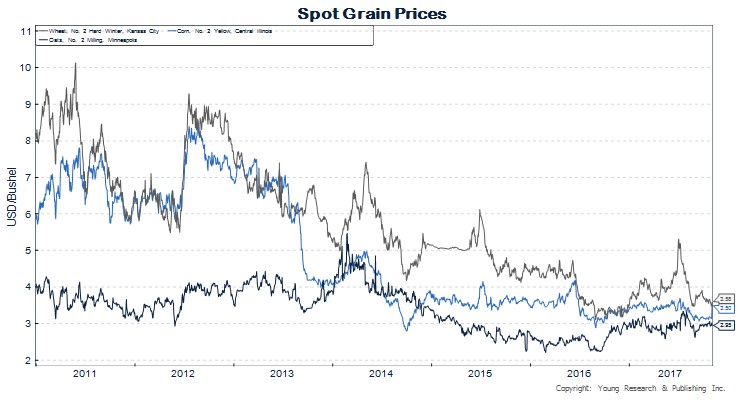
A glut of grain crops around the world has depressed prices for wheat, corn, and oats among others. The crops have seen five years of strong yields, filling storage facilities and driving prices way down. Jacob Bunge and Jesse Newman report that grain processors are about to get hit by the big oversupply.
Farmers are opting to store grain rather than sell it to grain companies at low prices. Some food companies, meanwhile, are placing fewer long-term orders for grain and ingredients since prices are expected to stay cheap. As low prices persist, the situation grows more difficult for the grain trading giants.
Bunge, based in White Plains, N.Y., Wednesday reported a 22% decline in quarterly profits due to pressure on its crop-trading and soybean-processing businesses; the company reduced the earnings projection for its grain-trading division for the third time this year.
Chicago-based ADM on Tuesday said its quarterly net income dropped by 44%, weighed down by declining U.S. grain exports, as cheap Brazilian corn undercut U.S. shipments.
Cargill, a top commodities dealer based in suburban Minneapolis, said in September its quarterly grain-trading and processing results declined compared with the same period a year ago and blamed slower grain markets and weak prices.
Agribusinesses have to adjust to the shifting global marketplace for basic foodstuffs. Farmers in South America and other international breadbaskets are harvesting bumper crops, generating fierce new competition to U.S. grain. Russia recently claimed the world-wide lead in wheat exports, and Brazil dethroned the U.S. in soybean shipments five years ago.
The U.S. remains the largest corn exporter, but its dominance is waning. U.S. corn exports this season are projected to fall nearly 20% from a year earlier, hitting their lowest level since a drought in 2012 shriveled fields, according to the U.S. Agriculture Department. South American farmers’ massive corn harvest this year, along with currency shifts that have made those crops cheaper, have enabled Brazil and Argentina grain to encroach on the U.S. corn’s traditional period to supply international buyers, trading-firm executives said.
Read more here.
You can see the weak performance of grain crops on the chart below.




